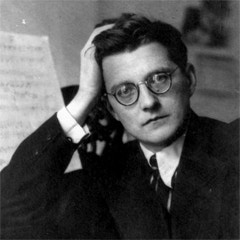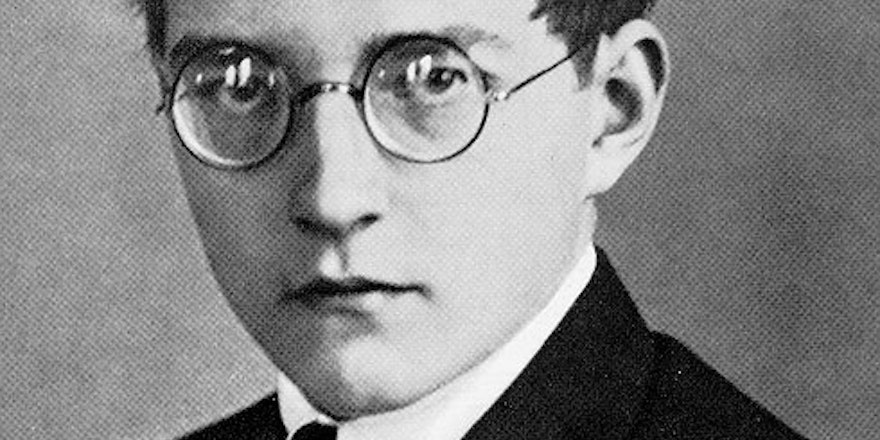This blog post will be about my Eminent person, Dmitri Shostakovich, the Soviet composer. It is also written from the point of view of Shostakovich himself.

Why I am Eminent
I should be remembered among influential artists in classical music because of my uniqueness in style. No other composer sounds like me. Although there are some like Schnittke who take heavy influenc:format(jpeg):mode_rgb():quality(40)/discogs-images/A-115461-1587155935-2709.jpeg.jpg) e from me, my sound is truly my own. I was able to compose music that complied with the Soviet art limitations of my time and to also compose music that truly expresses what I wanted to express with them. Of course, there were times where the government or public did not like what I was composing (like my opera, Lady Macbeth for example), but every great artist receives backlash and criticism, and that is what I think I am: A great artist.
e from me, my sound is truly my own. I was able to compose music that complied with the Soviet art limitations of my time and to also compose music that truly expresses what I wanted to express with them. Of course, there were times where the government or public did not like what I was composing (like my opera, Lady Macbeth for example), but every great artist receives backlash and criticism, and that is what I think I am: A great artist.
Although I did not compose as many symphonies as Haydn (with a count of 104 symphonies), I am known for my orchestral works which consist of 15 symphonies and 6 concerti, many of which were composed during the aforementioned time of art constrictions in the Soviet Union. Since I was able to compose such compelling art under such limitations, it shows that I was a very brave individual in such difficult times and I think that one can learn from my experiences to stay resilient in such times, especially with the COVID-19 pandemic.
Timeline
- September 25th, 1906: I was born in Saint Petersburg, Russia.
- 1915: I start taking piano classes at age 9.
- 1919: I compose my first orchestral piece, a Scherzo in F# Minor.
- 1924 – 1926: I compose and premier my first symphony.
- 1932: An opera I have composed, Lady Macbeth of the Mtsensk District, is completed.
 January 26th, 1936: Stalin visits the Bolshoi Theater, where my opera, Lady Macbeth is being played. Stalin did not approve of the opera.
January 26th, 1936: Stalin visits the Bolshoi Theater, where my opera, Lady Macbeth is being played. Stalin did not approve of the opera.- January 28th, 1936: A government-approved magazine, Pravda, releases an issue on the third page of the magazine titled “Muddle Instead of Music,” talking about my opera negatively.
- November 21st, 1937: My fifth symphony is premiered in Leningrad, and it received an ovation that lasted over half an hour.
- March 5th, 1942: My seventh symphony (the most popular one, titled “Leningrad”) premiered in the city of Kuybyshev (now known as Samara).
- August 9th, 1975: After many composition releases, I die in 1975.

Major Accomplishments
I have received many awards throughout my lifetime, and even one after. Here is a list of all the awards I have received:
- Order of the Red Banner of Labour (1940)
- Stalin Prize (1941)
- Stalin Prize (1942)
- Stalin Prize (1946)
- Order of Lenin (1946)
- People’s Artist of the RSFSR (1948)
- Stalin Prize (1950)
- Stalin Prize (1952)
- People’s Artist of the USSR (1954)
- International Peace Prize (1954)
- Order of Lenin (1956)
- Lenin Prize (1958)
- Wihuri Sibelius Price (1958)
- Member of the Royal Academy of Science, Letters and Fine Arts of Belgium (1960)
- Hero of Socialist Labour (1966)
- Order of Lenin (1966)
- Gold Medal of the Royal Philharmonic Society (1966)
- USSR State Prize (1968)
- Order of the October Revolution (1971)
- Léonie Sonning Music Price (1973)
- Glinka State Prize of the RSFSR (1974)
- Shevchenko National Prize (1976 (posthumously))
Besides these awards, I am also known for my repertoire of orchestral music, which includes 15 symphonies and 6 concerti, of which many were written under the government limitations of Soviet art.
A Tribute Piece to Myself
I wrote a short piece to commemorate my life. In it, I use my signature motif, DSCH. You can hear this motif in the first four notes of the piece. Here is the score for the piece, and below is my piece played by a computer.
Interview Reflection
This is the only part of my Learning Center that is outside the point of view of my Eminent person.
I held an interview with Mr. Trovato, the music teacher at my school, and talked to him about how composers compose music. The truth is that different composers compose music in different ways. “Some people hear a melody they like, some people take a walk and hear a bird singing and that inspires them, it’s different for everybody.” After this interview, I decided to think of ways that I could come up with a melody that I could write a whole piece about. I had to keep in mind that I needed to represent Shostakovich in some way in the piece, so I experimented with different melodies until I was reminded of his signature motif, DSCH. You can hear the motif in the main theme of the piece I composed. Before conducting the interview, I had a lot of trouble thinking of who to email since my Eminent person, Shostakovich, is not very well-known outside of the classical music community. Even then, he is not nearly as popular compared to composers like Mozart and Schubert. So, for the majority of the time, I was stuck trying to find someone who could fit the criteria as an interviewee. However, I soon realized that the person to interview did not have to be incredibly fancy, like a foundation. I then simplified what I could ask the interviewee to “how different people compose music”, as that is directly related to what I decided to do for my learning center: To compose a piece of music. So, I interviewed a person much closer to me than where I imagined: My school’s music teacher.

After interviewing Mr. Trovato, I felt relieved that the interview did not have to be such a stressful idea, and that had given me the perfect boost to my “morale” that I had needed. I was then ready to start experimenting with different ideas and what the main theme of my composition could be. A few days later, I was experimenting on the piano that I have at home with my mom watching TV and my dad playing on a Persian instrument, a setar, until I remembered the DSCH motif that I hear so frequently in Shostakovich’s music. Not only did this motif appear so much in his music, but Shostakovich was also generally known for his quotations in music. After experimenting a bit with what could be done with both the left hand and right hand on the piano, I knew that this would be the motif to use for my piece. Soon enough, I had opened a document on MuseScore 3 and started composing.
If I had not interviewed Mr. Trovato, I would not have known to experiment with different themes and melodies to come up with the perfect one to use. I would now like to thank Mr. Trovato for being my interviewee on such short notice over email, and my friends for helping to look over various parts of my Eminent project (speech and musical piece for examples).

References
Wikimedia Foundation. (2021, November 22). Dmitri Shostakovich. Wikipedia. Retrieved November 26, 2021, from https://en.wikipedia.org/wiki/Dmitri_Shostakovich.
The Wikipedia page for Shostakovich is detailed, to say the least. From it, one can learn a lot about various aspects of his life, ranging from general information to awards and notable works from him, and that is exactly the type of information that I plan on using from this page. The thing about Wikipedia pages is that they can be edited by any party, meaning that multiple parties have contributed to it. Not only that, but considering that Shostakovich is now long dead, I suspect that a lot of information has been gathered about him and that many people have found out what information is correct and what information is not.
Brown, D. (2021, September 21). Dmitri Shostakovich. Encyclopædia Britannica. Retrieved November 26, 2021, from https://www.britannica.com/biography/Dmitri-Shostakovich.
Britannica is also another source of information that never fails to provide useful information if Wikipedia is not to be trusted. The Britannica site for Shostakovich covers much the same topics and assures one if the information that they have gathered from another site is correct. That is exactly what I used this Britannica site for.
Wikimedia Foundation. (2021, June 1). Muddle instead of music. Wikipedia. Retrieved November 27, 2021, from https://en.wikipedia.org/wiki/Muddle_Instead_of_Music.
The Wikipedia page above covers the Pravda issue about Shostakovich’s opera, Lady Macbeth. I used this source for part of the timeline of Shostakovich’s life, and I think that this page once again is reliable like other Wikipedia pages because of their ability to be contributed to by any parties.
Dmitri Shostakovich. Preceden. (n.d.). Retrieved November 28, 2021, from https://www.preceden.com/timelines/310245-dmitri-shostakovich.
This website presents the events of Shostakovich’s life in a neat, clean, understandable way. I used this website for exactly that: The timeline. I have also skimmed through other sites and found that the majority of the information on this site is correct, so I have come to the conclusion that that site is credible.
Wikimedia Foundation. (2021, November 24). Symphony No. 7 (Shostakovich). Wikipedia. Retrieved November 28, 2021, from https://en.wikipedia.org/wiki/Symphony_No._7_(Shostakovich).
Finally, this is the Wikipedia page for Shostakovich’s seventh symphony, the Leningrad, his most popular symphony. This source is credible for the same reason as the other Wikipedia pages I have used, and I have used this source for exactly what you may think: For information about his seventh symphony.
Hey Dmitri, I enjoyed reading your learning centre. The pictures that you included on your post were visually appealing. It was easy to read and follow. One question I have is if you were still alive right now, do think you would like classical music.
Hello, thank you for the comment. Regarding your question about the modern classical music of today, it would depend on what classical music I am listening to. I am assuming you are talking about today’s very abstract, contemporary music. Some of the classical music today is so incredibly bland that it’s not music anymore. However, I think that the contemporary music of my time is the perfect amount of modern style so that it still conveys emotion. In summary, it would depend on what type of classical music you are referring to. Thank you for the comment.
Cool learning centre, Kavyan! I love how organized it is, because it is very easy to read and understand, and also very linear. I also like the way you inserted a clip of his music into your centre, it added more depth to your information.
A question for Mr. Shostakovich, do you believe that having artistic restrictions is a helpful tool in writing music, or is it better to not have limitations, more like nowadays?
Hello. Thank you for the comment. I think that it is better to not have limitations on music, but some will abuse that to make something other than music. I think that there should not be limitations on creating music, but that does not mean that the listener does not have their own taste/preference. That is my answer to your question. Thank you for commenting.
Hello Kavyan. I found your learning center very engaging, and I especially enjoyed the piece of music you added in. I also enjoyed how you pictures in your learning center, and how you occasionally inserted them in between two paragraphs instead of always putting them on the side. A question I have is: Are there any composers that you took inspiration from or felt inspired by? If so, whom would that be?
Hello Joshua. Thank you for the comment. If you’re asking Kavyan that question, I’m not really inspired by anyone but I listen to a lot of violin concertos (Tchaikovksy, Brahms, Bruch, and others) and (of course) a lot of Shostakovich. If you’re asking Shostakovich that question, he’s inspired by Sergei Prokofiev and Igor Stravinsky, both Russian composers of his time. I have linked the Wikipedia pages for them below if you would like to learn more about them.
https://en.wikipedia.org/wiki/Sergei_Prokofiev
https://en.wikipedia.org/wiki/Igor_Stravinsky
Hi Dmitri,
I particularly liked your use of images – they were simple but provided context and offered a break from the text. Similarly, your post’s structure was clear and very easy to follow, while the amount of text was not overwhelming. Additionally, adding different elements – lists, paragraphs, audio, etc., created interest and made the post a joy to read. My question is: Without the restrictions of your day, how would you have written your music differently? Do you think your music would be as unique as it is?
Edward
Hello Edward. Thank you for the comment. I think that the pressure I was put under, however inhuman, molded me into the composer that I am today. Some people view my music as bland, but without the restrictions of my day, I would not have grown into the composer that makes the type of music that I make. I think that if there were no restrictions, I would have composed more “classical” music near the end of my career, since that is when the pressure reached me and my music structure. I hope that answers your question. Thank you.
hey Dmitri, I really enjoyed reading through your learning center; it was engaging and really interesting. One question I had is: because of the limitations of the past in comparison to now, what do you think about the new tactics that may be used when composing?
Hello. Thank you for the comment. I think that today, many people can use very odd tactics when composing music (such as randomly generating a melody), but as long as the final produce expresses emotion and tells a story, I think it is fine.
Greetings Господин Shostakovich, I really enjoyed your learning centre, and more specifically, the orchestral masterpiece. It is truly inspiring how such beautiful art can arise under the strictest conditions of soviet rule. Although these limitations challenged your work, do you think these limitations also shaped your work? Thus, making them one of a kind?
Hello. Thank you for the comment. Of course. Although I still shudder looking back on those times, I know for a fact that those times made me the composer that I am today, and I would not have composed the music that I have without those limitations. In other words, those limitations are exactly what helped me compose music that expresses what I want to express in a weird way. I hope that answers your question.
Dmitri, thank you for sharing your life and music with us. Your composition using the DSCH motif was especially impressive! You mentioned the constraints of the Soviet era and surroundings on your creativity. I wonder if perhaps your ability to flourish under such restraints might have actually improved your musical prowess and creativity? Have you considered how having specific parameters has influenced your music?
Hello. Thank you for the comment. Of course, the restraints I was put under in Stalin’s control definitely made an impact on my music that some consider positive and some consider negative. However, this is the same for all forms of art, as artistic beauty is subjective. Under Stalin’s rule, there were rules implemented that essentially made it so that all art could be made to tell the public what to do. This is why contemporary art was banned. I think that if Stalin had never made those laws, my compositions would have been a lot more contemporary and abstract, and fewer people would understand my art. I hope that answers your question.
Dmitri,
You led a interesting life. What was your favorite piece of music to compose and why?
Hello. Thank you for your comment. While I would not say that I have any favourite piece of music in particular, I will say that I enjoyed composing my chamber works (string quartets, piano trios) more than my orchestral works (symphonies, concerti). This is because there was less restriction on my chamber works as I composed them after Stalin’s ruling period of the USSR.